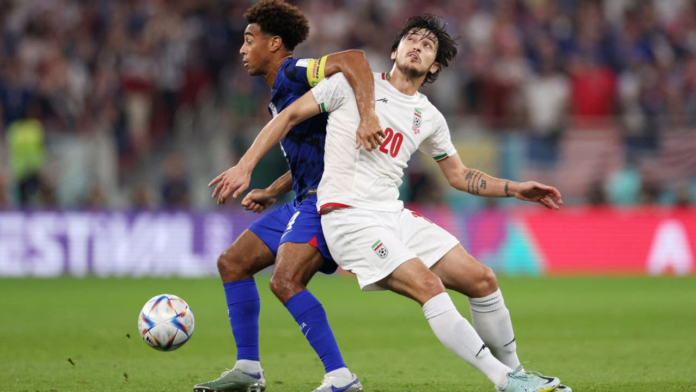Iran’s national soccer team received a subdued welcome home after its World Cup defeat against the United States, a match played against the backdrop of ongoing anti-government protests in Iran. One Iranian man was shot dead celebrating the American victory.
The players returned from Qatar late Wednesday, a day after their 1-0 loss. Anti-government protesters, considering the team a symbol of Iran’s clerical rulers, had celebrated the loss in some Iranian cities with fireworks and cheers.
VIDEO: Team USA’s Antonee Robinson breaks down in tears in locker room after emotional win over Iran
One man was shot dead by Iranian security forces in northwest Iran for honking his car horn in support of the U.S. victory, the Oslo-based rights monitor Iran Human Rights reported on Thursday.
Iran’s treatment of the players will likely be scrutinized because they refrained from singing the Islamic Republic’s national anthem during their opening World Cup match. Many considered the move a show of solidarity with the protests. The team did sing the anthem in subsequent matches.
Iran fans wave flags as they gather at Imam Khomeini Airport in Tehran on December 1, 2022 to greet the Iranian national team upon their return after competing in the Qatar 2022 World Cup. – The United States beat Iran 1-0 to reach the knockout phase Expand
A few dozen fans greeted the national team’s return at Tehran’s international airport late Wednesday, with people cheering and waving the Iranian flag.
Yet the players have faced biting criticism from anti-government protesters who have blamed the team for not being more vocal about the security force’s violent put down of the demonstrations. Human rights groups say over 400 protesters have been killed in the crackdown, with thousands more arrested.
An image of players bowing in the presence of President Ebrahim Raisi before setting off to the tournament was widely criticized by activists on social media. A hardline cleric, Raisi has likened protesters to “flies” and dismissed the movement as a foreign plot, without offering any proof.
Mehran Samak, 27, was shot dead after honking his car in support of the U.S. win after Tuesday’s match in the city of Bandar Anzali in northwest Iran. Oslo-based Iran Human Rights reported he was “shot in the head by state forces when he went out to celebrate the Islamic Republic’s loss.”
Samak is also a childhood friend of Iranian midfielder Saeed Ezatollahi, who mourned his death on his social media. But again he received criticism from activists for not explicitly stating Samak was killed by government forces.
Many Iranian celebrities have however been targeted by the government with arrest or other measures for speaking out on behalf of the protesters.
Team USA players share emotional embrace with Iran’s Saeid Ezatolahi
Iranian officials acknowledged but downplayed compatriots celebrating the U.S. win. Gen. Hossein Salami, chief of the paramilitary Revolutionary Guard, said those who had celebrated were doing so on “behalf of the enemies,” adding “it is not important to us.” His comments appeared in the semi-official Tasnim news agency.
A former culture minister and editor-in-chief of the Ettelaat newspaper, Abbas Salehi, who has close ties with Iranian Supreme Leader Ayatollah Ali Khamenei, tweeted: “Iran’s defeat in the game against America was bitter, but even more bitter was the happiness of some people.”
DOHA, QATAR – NOVEMBER 29: Tyler Adams of United States battles for possession with Sardar Azmoun of IR Iran during the FIFA World Cup Qatar 2022 Group B match between IR Iran and USA at Al Thumama Stadium on November 29, 2022 in Doha, Qatar. (Photo Expand
Iran was eliminated from the tournament in Qatar following the loss to the U.S. on Tuesday that saw the players scrambling to score a goal in the last remaining minutes of the game. Striker Sardar Azmoun told reporters he was not satisfied with his performance in the last match.
It was the sixth time Iran has participated in the World Cup.
Anti-government protests first erupted in September, following the death of 22-year old Mahsa Amini in the custody of Iran’s morality police in the capital, Tehran. The protests quickly grew into the most serious challenge to Iran’s theocracy since its establishment in the 1979 Islamic Revolution.



